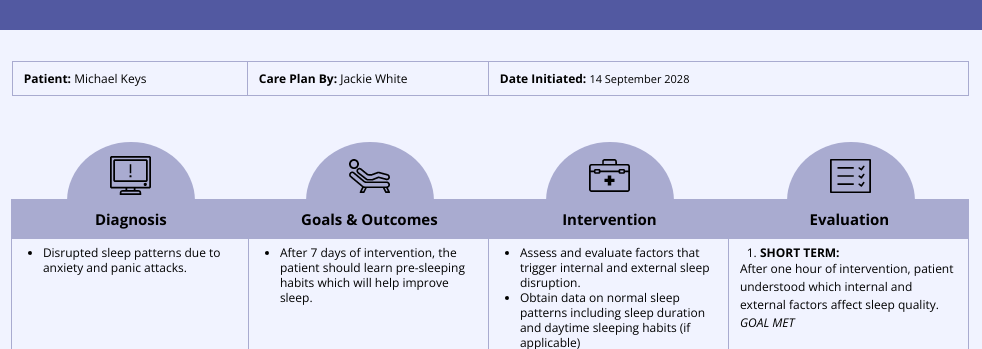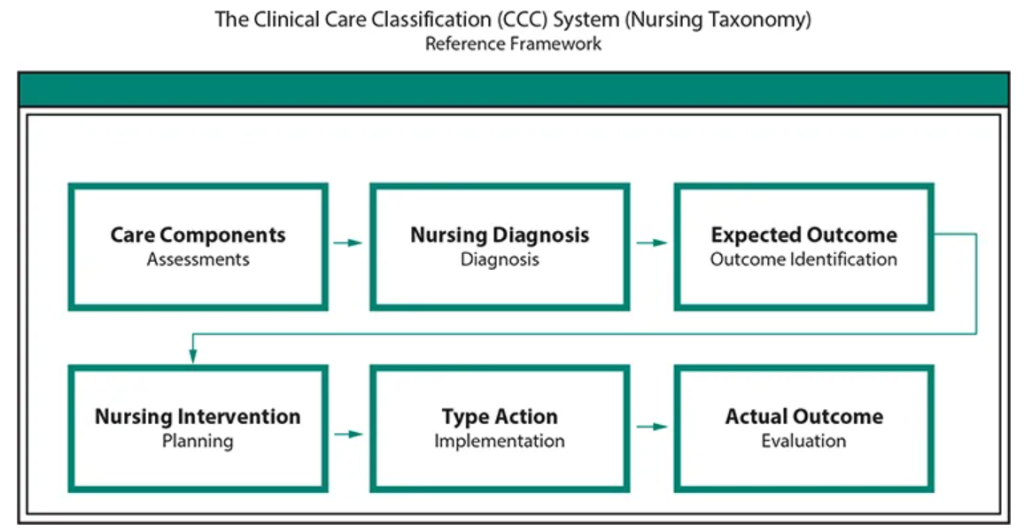
Table of Contents
The nursing care plan assignment is a cornerstone of nursing education, offering students a practical application of theoretical knowledge and honing their clinical reasoning skills. This assignment goes beyond simple memorization; it demands an understanding of the patient’s unique needs, formulating tailored interventions, and evaluating their effectiveness. Achieving an exceptional nursing care plan assignment requires a meticulous approach, incorporating elements of critical thinking, compassion, and comprehensive knowledge.
This guide provides comprehensive instructions and tips to help you craft a nursing care plan assignment that stands out:
What is a Nursing Care Plan?
A nursing care plan is a comprehensive document that outlines individualized care for a patient based on their specific needs and goals. It’s essentially a roadmap for nurses to provide the most effective and safe care throughout the patient’s stay.
Here’s a breakdown of its key elements:
1. Assessment:
- Gathering information: This includes the patient’s medical history, physical assessment, and any relevant social or psychological factors.
- Identifying problems: Based on the collected data, the nurse identifies the patient’s actual or potential health problems, known as nursing diagnoses.
2. Planning:
- Setting goals: The care plan outlines specific, measurable, attainable, relevant, and time-bound (SMART) goals for the patient.
- Developing interventions: The nurse creates a list of actions to help the patient achieve their goals. These may include medication administration, wound care, education, emotional support, and more.
- Establishing timelines: The care plan specifies when each intervention should be performed.
3. Implementation:
- Carrying out interventions: The nurse actively performs the planned interventions to help the patient. This may involve direct care, collaboration with other healthcare professionals, or patient education.
- Monitoring progress: The nurse continuously assesses the patient’s response to the interventions and makes necessary adjustments to the plan.
4. Evaluation:
- Assessing effectiveness: The nurse regularly evaluates whether the interventions are helping the patient achieve their goals.
- Making revisions: Based on the evaluation, the care plan may be revised to ensure it remains effective and relevant to the patient’s current needs.
Benefits of a Nursing Care Plan:
- Individualized care: Tailored to the patient’s unique situation, ensuring their specific needs are met.
- Improved communication: Provides a shared understanding of the patient’s care among all involved healthcare professionals.
- Enhanced coordination: Helps streamline care and ensure continuity between different healthcare settings.
- Improved patient outcomes: By focusing on patient goals and interventions, care plans help achieve better health outcomes.
- Increased accountability: Provides a framework for evaluating the effectiveness of care and identifying areas for improvement.
Types of Nursing Care Plans:
- Standardized plans: Pre-designed plans for common conditions or procedures.
- Individualized plans: Developed specifically for each patient based on their unique needs.
- Critical pathways: Structured care plans for specific diagnoses or procedures with pre-defined timelines and interventions.
Overall, a nursing care plan is an essential tool for providing safe, effective, and patient-centered care. It serves as a guide for nurses, ensuring that the patient’s needs are addressed throughout their healthcare journey.
Steps to Writing a Stellar Nursing Care Plan Assignment
I. Understanding the Foundation: The Nursing Process
The nursing care plan assignment is built upon the foundation of the nursing process, a systematic framework used to guide patient care. This process comprises five interconnected stages:
1. Assessment: This stage involves gathering subjective and objective data about the patient’s current health status, including medical history, physical examination findings, vital signs, and psychosocial factors. This information forms the basis for identifying patient needs and formulating appropriate interventions.
2. Diagnosis: Here, you analyze the gathered assessment data to identify actual or potential health problems experienced by the patient. These nursing diagnoses are specific, measurable, achievable, relevant, and time-bound (SMART) statements that describe the patient’s current health status.
3. Planning: This crucial stage involves developing individualized goals and interventions for each identified nursing diagnosis. These interventions should be specific, realistic, and evidence-based. Your goal is to create a plan that promotes the patient’s well-being and supports their recovery.
4. Implementation: This stage involves putting the planned interventions into action. This may involve direct patient care, education, medication administration, or collaborating with other healthcare professionals. Accurate documentation of interventions and patient responses is essential.
5. Evaluation: Finally, you evaluate the effectiveness of the interventions and their impact on the patient’s health status. This involves reassessing the patient, comparing their progress to the established goals, and modifying the care plan as needed.
II. The Anatomy of an Exceptional Nursing Care Plan Assignment
A well-crafted nursing care plan assignment is more than simply listing interventions; it demonstrates a comprehensive understanding of the nursing process and patient-centered care. Here’s a detailed breakdown of the key components:
1. Patient Profile: This section should provide a clear and concise overview of the patient, including their demographics, medical history, current health status, and any relevant social or cultural factors. This foundation will help you understand the patient’s needs and develop a personalized care plan.
2. Nursing Diagnoses: Using the gathered assessment data, identify and clearly state at least three nursing diagnoses relevant to the patient’s condition. Each diagnosis should be supported by specific evidence from the patient’s assessment. Avoid generic diagnoses and focus on those directly impacting the patient’s well-being.
3. Goals and Interventions: For each nursing diagnosis, set SMART goals that are specific, measurable, achievable, relevant, and time-bound. These goals should clearly articulate desired outcomes for the patient. For each goal, list multiple evidence-based interventions that aim to achieve the desired outcome. These interventions should be specific, detailed, and practical, reflecting your knowledge of nursing practice and patient-centered care.
4. Evaluation: This section critically evaluates the effectiveness of the interventions in achieving the established goals. Describe the patient’s progress, using data collected during implementation, and analyze the impact of interventions on the patient’s health status. If the interventions were not effective, explain why and propose alternative strategies.
5. Rationale: Throughout the nursing care plan assignment, provide clear and concise rationales for each diagnosis, goal, and intervention. Support your choices with evidence-based research, citing reputable sources. This section demonstrates your knowledge of nursing theory and its application in practice.

III. Tips for Crafting an Exceptional Nursing care plan assignment
1. Choose a Patient Case Carefully: Select a patient case that presents a variety of challenges and opportunities for developing a comprehensive nursing care plan assignment. Focus on cases that allow you to demonstrate your understanding of complex health conditions and multifaceted patient needs.
2. Conduct a Thorough Assessment: The accuracy and depth of your assessment directly impacts the quality of your nursing care plan assignment. Be meticulous in gathering data from various sources, including the patient, their medical records, and relevant literature.
3. Prioritize Patient Needs: Your nursing care plan assignment should prioritize the patient’s individual needs and preferences. Avoid generic interventions and focus on those that are tailored to the patient’s specific situation.
4. Utilize Evidence-Based Practice: Ensure that all your interventions and rationale are supported by current research and evidence-based practice guidelines. This demonstrates your commitment to providing the best possible care for your patients.
5. Seek Feedback and Collaboration: Don’t hesitate to seek feedback from your instructors or peers on your nursing care plan assignment. This collaborative process can help you identify areas for improvement and strengthen the overall quality of your work.
6. Stay Organized: Utilize tables and charts to clearly present your data, diagnoses, goals, interventions, and evaluations. This organization will make your nursing care plan assignment easier to read and comprehend.
7. Proofread Carefully: Before submitting your nursing care plan assignment, meticulously proofread it for grammatical errors, spelling mistakes, and inconsistencies. A polished presentation enhances the credibility of your work.
Examples of Strong Nursing Care Plan Assignments
1. Patient with Chronic Obstructive Pulmonary Disease (COPD): This nursing care plan assignment could focus on improving the patient’s oxygenation, reducing respiratory distress, and promoting self-management of their condition. You could include interventions such as respiratory exercises, medication administration, and patient education on lifestyle modifications.
2. Patient with Type 2 Diabetes: This nursing care plan assignment could focus on managing blood glucose levels, preventing complications, and promoting healthy lifestyle choices. You could include interventions such as dietary counseling, exercise recommendations, and monitoring of blood glucose levels.
3. Patient with Heart Failure: This nursing care plan assignment could focus on managing fluid overload, improving cardiac function, and promoting adherence to medication regimens. You could include interventions such as medication administration, fluid restriction, and patient education on heart failure management.
Beyond the Assignment: The Value of Nursing Care Plans in Practice
While the nursing care plan assignment is a valuable educational tool, its real-world application is vital in patient care. Here’s how:
1. Individualized Care: Nursing care plans provide a framework for delivering personalized care to each patient, recognizing their unique needs and preferences. This ensures that interventions are tailored to promote their well-being and address their specific health concerns.
2. Collaboration and Communication: Nursing care plans facilitate effective communication among healthcare professionals. By clearly outlining the patient’s care needs, goals, and interventions, nurses can effectively collaborate with doctors, pharmacists, and other members of the healthcare team, ensuring a coordinated approach to patient care.
3. Continuity of Care: Nursing care plans promote continuity of care, ensuring that patients receive consistent and effective care regardless of who is providing it. This is particularly important for patients with complex health conditions or those receiving care from multiple providers.
4. Quality Improvement: Nursing care plans are essential tools for evaluating the effectiveness of care and identifying areas for improvement. By analyzing patient outcomes, nurses can identify patterns and trends, leading to better practices and improved quality of care.
Common Mistakes to Avoid in Your Nursing care plan assignment
While the nursing care plan assignment is a valuable tool for honing your clinical reasoning and understanding of patient care, common mistakes can hinder its effectiveness and impact your grade. Avoiding these pitfalls is crucial to crafting an exceptional nursing care plan assignment.
1. Lack of Focus and Specificity:
- Mistake: Generic and vague diagnoses and interventions that don’t address the patient’s specific needs.
- Solution: Choose nursing diagnoses and interventions that directly relate to the patient’s unique circumstances, including medical history, current health status, and personal preferences.
2. Inadequate Assessment:
- Mistake: Not thoroughly gathering data from all available sources, including the patient, their medical records, and relevant literature. This leads to incomplete and inaccurate diagnoses and interventions.
- Solution: Conduct a comprehensive assessment, paying attention to both subjective and objective data, to form a complete picture of the patient’s health status.
3. Lack of Evidence-Based Rationale:
- Mistake: Failing to support each diagnosis, intervention, and goal with evidence-based research and practice guidelines. This demonstrates a lack of critical thinking and understanding of current best practices.
- Solution: Cite reputable sources and provide clear explanations for your choices, showcasing your knowledge of nursing theory and its application to patient care.
4. Ignoring Patient Preferences:
- Mistake: Ignoring the patient’s preferences and values when developing the nursing care plan.
- Solution: Include the patient in the care planning process whenever possible. Ask about their goals, priorities, and preferred methods of communication to ensure the plan is tailored to their needs and preferences.

5. Overly Complex Interventions:
- Mistake: Overloading the plan with too many interventions, making it overwhelming and impractical to implement.
- Solution: Prioritize the most essential interventions, focusing on those that directly address the patient’s most pressing needs.
6. Lack of Measurable Goals:
- Mistake: Using vague or unmeasurable goals that don’t allow for objective assessment of progress.
- Solution: Formulate goals that are specific, measurable, achievable, relevant, and time-bound (SMART), enabling you to track the patient’s progress and evaluate the effectiveness of interventions.
7. Poor Organization and Presentation:
- Mistake: Failing to present the nursing care plan assignment in a clear, organized, and professional manner.
- Solution: Utilize tables, charts, and proper formatting to present information effectively. Proofread carefully to eliminate any errors in grammar, spelling, or formatting.
8. Insufficient Evaluation and Reflection:
- Mistake: Failing to thoroughly evaluate the effectiveness of interventions and reflect on the outcomes. This demonstrates a lack of critical thinking and understanding of the nursing process.
- Solution: Describe the patient’s progress, analyze the impact of interventions, and address any challenges or unexpected outcomes. This showcases your ability to adapt and adjust the plan based on the patient’s response.
9. Plagiarism or Insufficient Citation:
- Mistake: Failing to properly cite all sources of information and using materials without attribution.
- Solution: Always cite your sources properly using an established referencing style, such as APA or MLA. Use plagiarism detection software to ensure your work is original.
10. Lack of Professionalism:
- Mistake: Presenting a nursing care plan assignment that appears sloppy, unorganized, or unprofessional. This reflects negatively on your commitment to nursing practice.
- Solution: Proofread carefully for any errors and ensure the overall presentation is polished and professional.
The nursing care plan assignment is an opportunity to showcase your understanding of the nursing process and your commitment to providing patient-centered care. By avoiding these common mistakes, you can elevate your nursing care plan assignment to an exceptional level, demonstrating your knowledge, critical thinking, and compassion.
Frequently Asked Questions about Nursing Care Plan Assignment
General:
- What is a nursing care plan?
- A nursing care plan is a written document that outlines the care a patient will receive based on their individual needs and goals. It includes assessments, nursing diagnoses, interventions, and expected outcomes.
- What is the purpose of a nursing care plan assignment?
- The assignment helps students develop critical thinking skills, apply nursing knowledge to real-life situations, and learn how to provide patient-centered care.
- What are the different types of nursing care plans?
- Common types include standardized care plans, individualized care plans, and critical pathways.
- How long should a nursing care plan be?
- The length varies depending on the complexity of the patient’s condition and the assignment requirements. Generally, it should be concise and focused on essential information.
- What are the key components of a nursing care plan?
- Typically, it includes a patient’s assessment, nursing diagnosis, goals, interventions, and evaluation.
Specific Components:
- How do I choose the right nursing diagnosis?
- Review your patient’s assessment data and identify any actual or potential health problems. Choose a diagnosis that accurately reflects their condition.
- How do I write effective nursing interventions?
- Interventions should be specific, measurable, achievable, relevant, and time-bound (SMART). They should also be based on evidence and aligned with the nursing diagnosis.
- How do I evaluate the effectiveness of my care plan?
- Monitor your patient’s progress regularly and assess whether the interventions are achieving the desired outcomes. Document your findings and make adjustments to the plan as needed.
Formatting and Submission:
- What format should I use for my care plan?
- Check with your instructor for specific formatting guidelines. Generally, use a clear and organized format with headings for each component.
- What are some tips for writing a good nursing care plan?
- Focus on the patient’s individual needs. Use clear and concise language. Be specific about interventions and expected outcomes.
- What should I include in my nursing care plan assignment?
- The assignment instructions should specify what needs to be included. It may include a case study, patient history, and specific requirements for the care plan.
- How do I submit my nursing care plan assignment?
- Follow the instructions provided by your instructor. It may be submitted electronically or in hard copy.
Additional Resources:
- Textbook resources: Refer to your nursing textbooks for guidance on developing and writing care plans.
- Online resources: Numerous online resources are available to help students understand and create care plans. Search for terms like “nursing care plan template,” “nursing care plan examples,” or “nursing care plan guide.”
- Instructor support: Don’t hesitate to ask your instructor for clarification or assistance with any aspect of the assignment.
The nursing care plan is a crucial tool for providing safe and effective patient care. By carefully planning and executing care, nurses can help their patients achieve optimal health outcomes.
Final Thoughts: The Journey of a Nurse
The nursing care plan assignment is more than just a classroom exercise; it is a critical step in the journey of becoming a competent and compassionate nurse. By mastering the art of developing exceptional nursing care plans, you’ll be well-equipped to provide high-quality, patient-centered care in any setting.

As you embark on this journey, remember that the Nursing care plan assignment is not just about fulfilling an assignment requirement, but about building a foundation for a career dedicated to promoting the health and well-being of your patients.
This assignment serves as a stepping stone, a testament to your dedication, and a reflection of your commitment to providing exceptional nursing care. Embrace the challenge, hone your skills, and let your compassion guide you in crafting exceptional Nursing care plan assignments.
This guide is a comprehensive resource to help you excel in this essential assignment, but remember: the most effective nursing care plan assignment is one that reflects your unique approach to patient care, demonstrating your knowledge, critical thinking, and commitment to excellence.
Get Professional Nursing Care Plan Assignment Help
Writing a stellar nursing care plan assignment may still be daunting, especially to beginner students. At Nursing Papers, we are the experts that you should engage for customized nursing care plan assignment writing help. We offer professional assignment writing help with nursing essays, case studies, research papers and dissertations. Besides assignment writing, we also do proofreading, editing, formatting and plagiarism removal.







